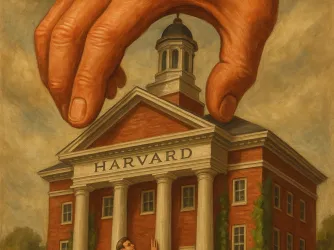Table of Contents
Tribunal Tribulations
Today, John Higgins of the Akron (Ohio) Beacon Journal takes a long and critical look at campus courts in two articles, one about the practices of campus courts in general and one about a University of Akron student who, although acquitted of drug trafficking in court, was convicted of it by a campus court and subsequently killed himself. The articles should send chills up the spine of any person who believes that justice is safe on America’s campuses.
In both articles, Higgins presents the story of University of Akron student Charles Plinton, who was charged but acquitted of selling drugs to a police and university-placed informant in the dorms of the University of Akron—a 35-year-old former felon nicknamed Hulk. As Higgins reports in “An academic response”:
Hulk was a key witness against a graduate student, Charles Plinton, who was acquitted of drug trafficking by a jury, but found “responsible” by a university panel.He was suspended for the fall 2004 semester. Plinton never returned to the university and took his own life on Dec. 12, 2005.…The university said it did not receive any complaints about Hulk’s conduct on campus.“At least six arrests were made as a result of using the confidential informant, with criminal convictions resulting in every case but one.”The one that didn’t result in a criminal conviction was Plinton, who came to Akron highly recommended for the master's program in public administration and had received a tuition waiver and a stipend for research work in the department.
The obvious question here is, of course, if a student is acquitted in a criminal trial, which features better procedures, more protections for the accused, and more tools for the prosecution than a university tribunal, why was he convicted (okay, found “responsible”) in a campus court? Higgins addresses that question in his second article, “Do campus tribunals wield too much power?” In this article, Higgins consulted Harvey A. Silverglate, FIRE cofounder and co-author of FIRE’s Guide to Due Process and Fair Procedure on Campus:
“Campus tribunals are the ultimate ‘kangaroo court,’ an affront to the rational thinking that is supposed to underlie the academic enterprise,” said Boston-area attorney Harvey A. Silverglate.… “It’s meant to keep people from expecting that the campus system is like the criminal justice system in the real world and from expecting a decent level of fairness,” Silverglate said.
The article goes on to demonstrate that this lack of a “decent level of fairness” isn’t a bug in campus courts, it’s a feature. The idea that criminal guilt should be proven “beyond a reasonable doubt” is a staple of American jurisprudence—but it’s almost unheard of on college and university campuses. Indeed, as the article points out, at many universities, not even the standard of “preponderance of the evidence” (a “51%” standard which means that the offense was more likely than not to have occurred) need be met for a student to be found guilty (sorry, “responsible”) for an offense. For instance, for nonviolent offenses the University of Akron used a “substantial” evidence standard. What does this mean? I apologize for the long quote, but this is important:
The National Center for Higher Education Risk Management consults with universities throughout the country on how to lower students’ expectations of due process by removing words that evoke the criminal justice system.Brett A. Sokolow, an attorney and president of the Pennsylvania-based nonprofit, said he hasn’t worked with the University of Akron.But he’s not surprised that a student found not guilty in a criminal court would still be found “responsible” at the university level.…It may be legal, but is it fair? Sokolow thinks so.“I think many people realize we’re not convicting students of crimes, and that colleges need more latitude to ensure safety within a closed, trusting community,” Sokolow said.The higher courts have given universities a wide berth in enforcing their own policies, but they do require some due process. Evidence against a student in an administrative hearing should at least be “substantial,” he said.…Sokolow figures that the substantial standard is satisfied if a third of the evidence points toward guilt. That’s a very rough estimate, Sokolow said, but it’s still less than half.
So, on many university campuses, a campus tribunal could decide that a student may be punished for an offense when two-thirds of the evidence points towards his or her innocence? If this is not, as Silverglate said, “an affront to the rational thinking that is supposed to underlie the academic enterprise,” I don’t know what would be such an affront. If America’s colleges and universities allow their concern for managing the risk of lawsuits to trump their concerns about liberty, their decline as educational and cultural forces in our society cannot be long behind.
Recent Articles
FIRE’s award-winning Newsdesk covers the free speech news you need to stay informed.

FAQ: Responding to common questions about the fight between Harvard and the Trump administration
Harvard vs. Trump isn’t just a headline, but a battle to decide whether the government can use funding to force ideological conformity. In this explainer, FIRE makes clear why not.

George Mason University calls cops on student for article criticizing Trump
After a GMU student wrote a provocative essay asking when violence against tyranny is justified, the university promptly forgot its own revolutionary roots — and called the cops.

Trump administration's coercion at Columbia is unlawful and unconstitutional
FIRE today filed a "friend of the court" brief in support of the AAUP in their lawsuit against the Department of Justice.

Thankfully, Larry David mocks Bill Maher – First Amendment News 467
First Amendment News is a weekly blog and newsletter about free expression issues by Ronald K. L. Collins and is editorially independent from FIRE.